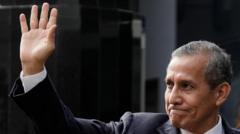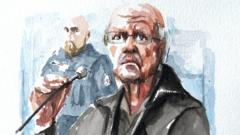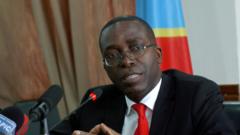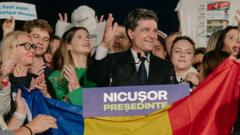Former Peruvian President Ollanta Humala and his wife, Nadine Heredia, have been convicted of money laundering, receiving a 15-year prison sentence after a lengthy trial connected to unlawful campaign financing.
Ollanta Humala Sentenced to 15 Years for Money Laundering in Peru

Ollanta Humala Sentenced to 15 Years for Money Laundering in Peru
Former President's Legal Battle Ends with Conviction in Connection to Odebrecht Scandal
In a significant ruling that underscores the ongoing political turmoil in Peru, former President Ollanta Humala has been sentenced to 15 years in prison for money laundering. This verdict was delivered by a court in Lima, where evidence was presented showing that Humala received illegal funds from the Brazilian construction giant, Odebrecht, to finance his election campaigns in 2006 and 2011.
His wife, Nadine Heredia, who played a key role in co-founding the Nationalist Party alongside Humala, was similarly found guilty of money laundering and has received the same 15-year sentence. During a trial that spanned over three years, prosecutors initially sought harsher punishments of 20 years for Humala and 26.5 years for Heredia.
The ruling was passed on Tuesday, with Humala present for the verdict, while Heredia attended via video link. Both denied any involvement in wrongdoing throughout the trial process.
Ollanta Humala's storied political career began in 2000 when he gained recognition for leading a brief military rebellion against President Alberto Fujimori. His political ascension was marked by a turbulent relationship with former Venezuelan President Hugo Chávez, whose alleged funding of Humala's 2006 campaign was used against him by political rivals, warning that his governance could mirror Venezuela's fate.
After shifting his campaigning tone in 2011, claiming to pursue a distinctly moderating policy modeled after Brazillian President Luiz Inácio Lula da Silva, Humala won the presidency against Keiko Fujimori. However, his early tenure faced significant challenge due to social conflicts and a waning legislative support.
Following his presidency, legal issues began to unfold in 2016 due to disclosures from Odebrecht about extensive bribery across LatAm that implicated numerous leaders, including Humala and Heredia. The court ruling continues to draw public and political attention amidst a larger narrative of corruption that continues to plague the region. Ultimately, Humala's presidency will now be marked not just by its policy pursuits but by its entanglement in significant legal controversies.



















